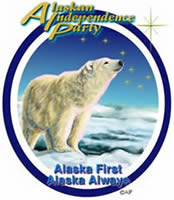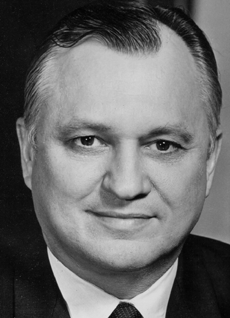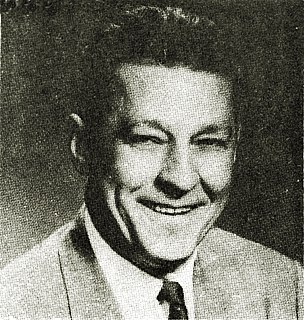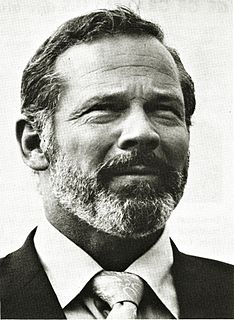
The Alaskan Independence Party (AKIP) is a political party and independence movement in the U.S. state of Alaska that advocates an in-state referendum which includes the option of Alaska becoming an independent country. The party also advocates positions similar to those of the Constitution Party, Republican Party and Libertarian Party, supporting gun rights, privatization, home schooling, and limited government.

Walter Joseph "Wally" Hickel was an American businessman, real estate developer, and politician. Starting out in Alaska during territorial days as a construction worker and subsequently a construction company owner/operator, he later became heavily involved with real estate development during Alaska's post-World War II boom period, building residential subdivisions at first, then branching out to building and operating shopping centers and hotels. Thrust into politics during the early 1950s by a power struggle within the territorial Republican Party and the battle to achieve statehood for Alaska, Hickel remained a formidable power in Alaskan politics for nearly a half century.

Keith Harvey Miller was an American Republican politician from Alaska. Miller was the second secretary of state of Alaska of Alaska under Walter Hickel. He became the third governor of Alaska after Hickel’s resignation. Under his tenure, Alaska came into sudden wealth after an oil lease sale on the North Slope created a revenue of $900 million.

John Bruce Coghill was a politician and businessman who was the lieutenant governor of Alaska from 1990 to 1994 under Governor Walter Hickel. Both were members of the Alaskan Independence Party.

Joseph E. Vogler was the founder of the Alaskan Independence Party. He was also chair or gubernatorial nominee during most of the company's existence. He was also known, originally in his adopted hometown of Fairbanks, Alaska, and later statewide, as a frequent participant in governmental and political affairs and frequent litigant in court. Curiously enough, he was known to many non-political observers for his fashion sense, in particular his ubiquitous wearing of fedoras and bolo ties.

Leland Chancy Croft is a workers' compensation attorney and Democratic Party politician from the U.S. state of Alaska. Elected to the Alaska House of Representatives in 1968, he served a single term from 1969 to 1971. He was then elected to the Alaska Senate, serving in that body from 1971 to 1979, including serving as the president of the Senate from 1975 to 1977 during the 9th Alaska State Legislature.
Bruce M. Botelho is an American attorney and politician in the U.S. state of Alaska. He served as the mayor of Juneau from 1988 to 1991 and from 2003 to 2012. Born and raised in Juneau, where his father was a top official of the Alaska Highway Patrol, Botelho has pursued concurrent careers in law and politics, largely with success. Botelho, in 2012, is finishing his third consecutive term as mayor, having first been elected in 2003. He also previously served a term as mayor from 1988 to 1991, defeating former Alaska Secretary of State Robert W. Ward in the election. He spent most of his professional career as an employee of the Alaska Department of Law. He rose to the top position in the department in 1994, when Governor Walter Hickel appointed him to be the Alaska Attorney General. Retained by Hickel's successor, Tony Knowles, Botelho served as Attorney General for nearly nine years before retiring from state service.

The 1998 Alaska gubernatorial general election took place on November 3, 1998. The election resulted in a landslide for the Democratic incumbent, Tony Knowles, who had won the 1994 gubernatorial election by only 536 votes. Knowles was the first incumbent governor to attain re-election since 1978. As of 2019, this is the most recent election in which a Democrat was elected Governor of Alaska and the most recent election in which an Alaskan governor was re-elected.
Robert Walter Ward was an American electrician, businessman, and government executive, and Republican politician from the U.S. state of Alaska. He was the third Secretary of State of Alaska from 1969 to 1970, and was the last person to serve under that title, as the title was changed to lieutenant governor by a constitutional amendment passed by voters on August 25, 1970 making him the first lieutenant governor of Alaska.

The 1994 United States gubernatorial elections were held on November 8, 1994 in 36 states and two territories. Many seats held by Democratic governors switched to the Republicans during the time known as the Republican Revolution.
Political party strength in Alaska has varied over the years. The communities of Juneau, Sitka, downtown and midtown Anchorage, the areas surrounding the College/University of Alaska Fairbanks campus and Ester and the "Alaska Bush" – rural, sparsely populated Alaska – stand out as Democratic strongholds, while the Kenai Peninsula, Matanuska-Susitna Valley, parts of Anchorage, and Fairbanks, Ketchikan, Wrangell, and Petersburg serve as the Republican Party electoral base. As of 2004, well over half of all registered voters have chosen "Non-Partisan" or "Undeclared" as their affiliation, despite recent attempts to close primaries.

The 1994 Alaska gubernatorial election took place on November 8, 1994, for the post of Governor of Alaska, United States. Democratic candidate Tony Knowles narrowly defeated Republican candidate Jim Campbell and Lieutenant Governor Jack Coghill of the Alaskan Independence Party. In the Republican Revolution year of the 1994 elections, Alaska's was the only governor's seat in the country to switch from Republican to Democratic.

The 1990 Alaska gubernatorial election took place on November 6, 1990, for the open seat of Governor of Alaska. In 1989, incumbent Governor Steve Cowper, a Democrat, had announced that he would not seek re-election for a second term.

Louis Mead Treadwell II is an American businessman and politician who served as lieutenant governor of Alaska from 2010 to 2014. Treadwell is the former Chair of the U.S. Arctic Research Commission serving from 2006 to 2010. He is a member of the Republican Party and was a candidate for the 2014 U.S. Senate election in Alaska.

The 1982 Alaska gubernatorial election took place on November 2, 1982, for the post of Governor of Alaska. To replace outgoing Republican governor Jay Hammond, Democratic nominee Bill Sheffield defeated three opponents: Republican nominee Tom Fink, Libertarian nominee Dick Randolph and Alaskan Independence Party nominee Joe Vogler. Hammond had endorsed his lieutenant governor, Terry Miller, who lost the Republican nomination to Fink in the primary election.

The 1978 Alaska gubernatorial election took place on November 7, 1978, for the post of governor of Alaska. Republican incumbent Jay Hammond defeated four opponents: former Governor of Alaska and write-in candidate Walter Hickel, Alaska Senator and Democratic nominee Chancy Croft, former Commissioner of Natural Resources and Independent candidate Tom Kelly and Alaskan Independence Party nominee Don Wright. After losing to Hammond in the Republican primary, Hickel ran as a write-in candidate and was able to outperform Croft.

The 1966 Alaska gubernatorial election took place on November 8, 1966, for the post of Governor of Alaska. Republican challenger Walter Hickel narrowly defeated incumbent Democratic governor Bill Egan, falling just 3 votes short of an overall majority.

The 1962 Alaska gubernatorial election took place on November 6, 1962, for the post of Governor of Alaska. Incumbent Democratic governor Bill Egan was re-elected, defeating Republican challenger and former governor of Alaska Territory Mike Stepovich.
















